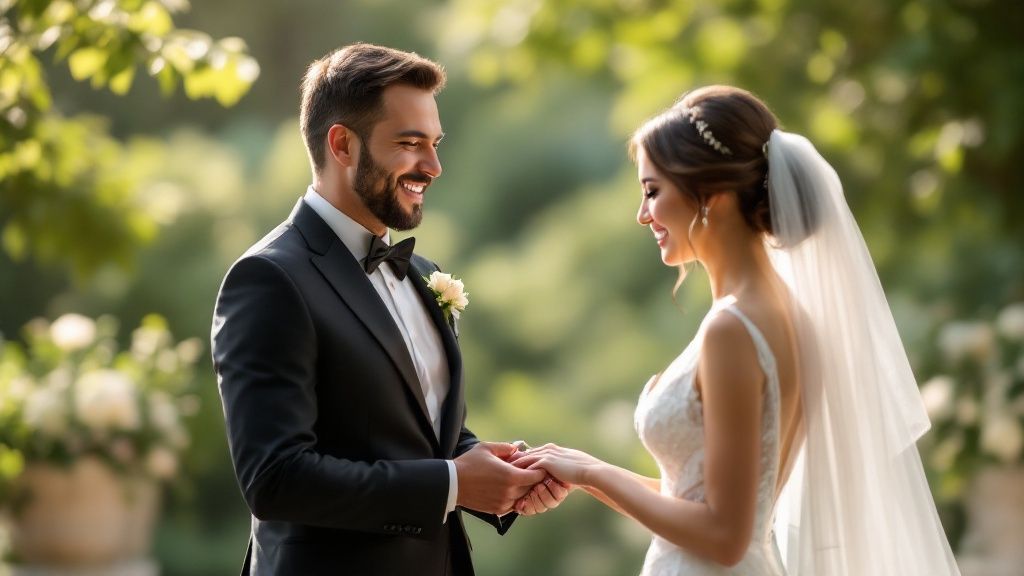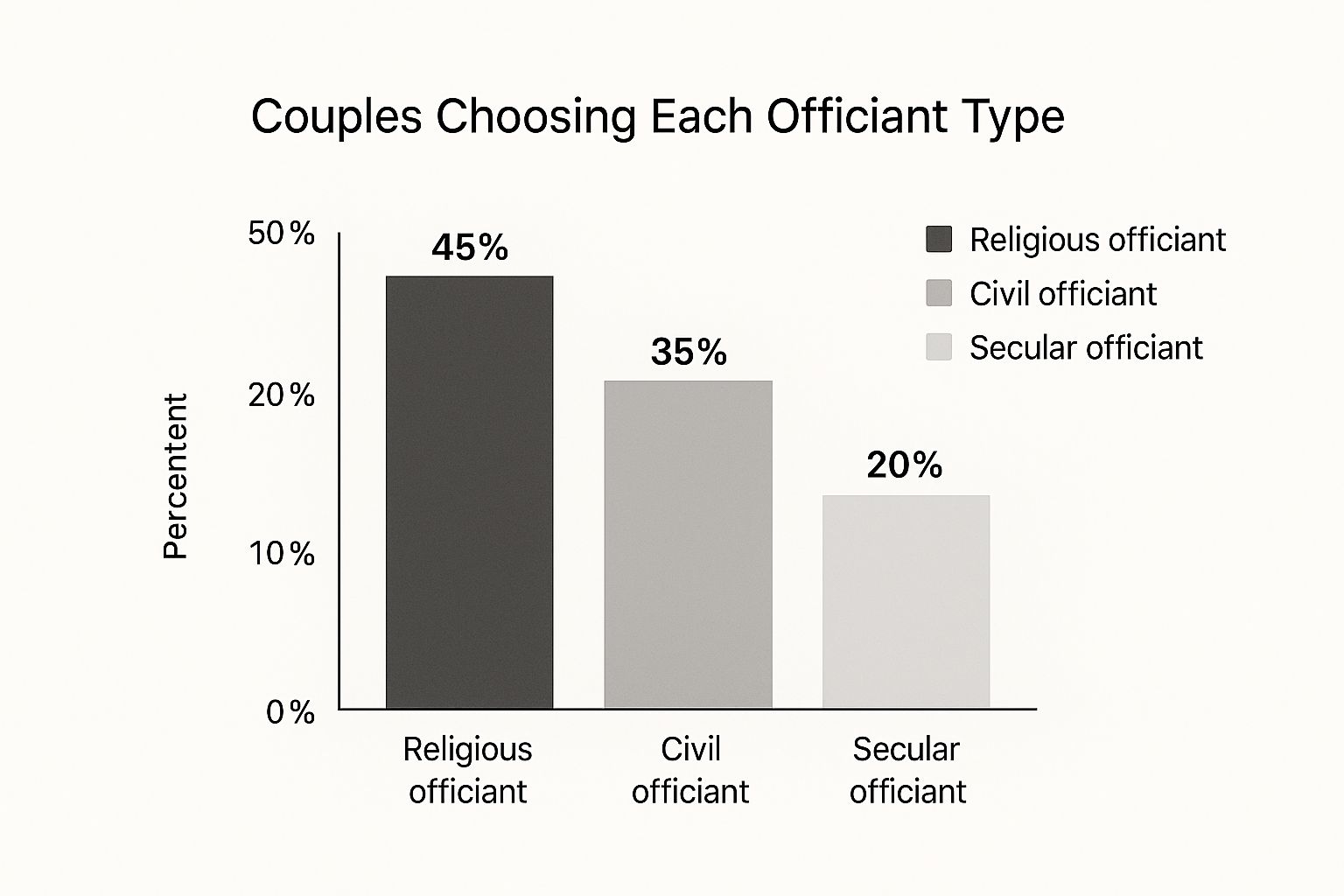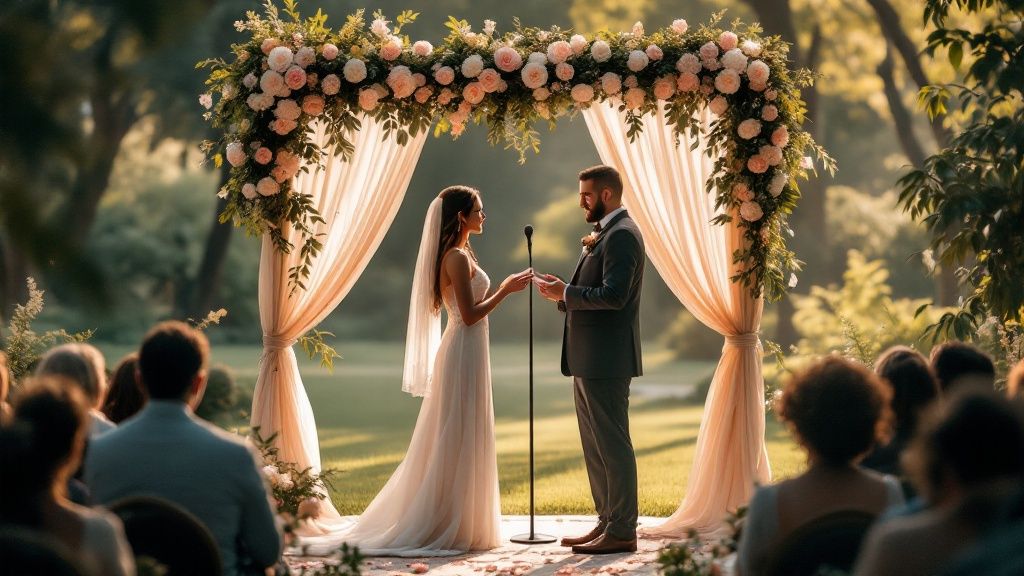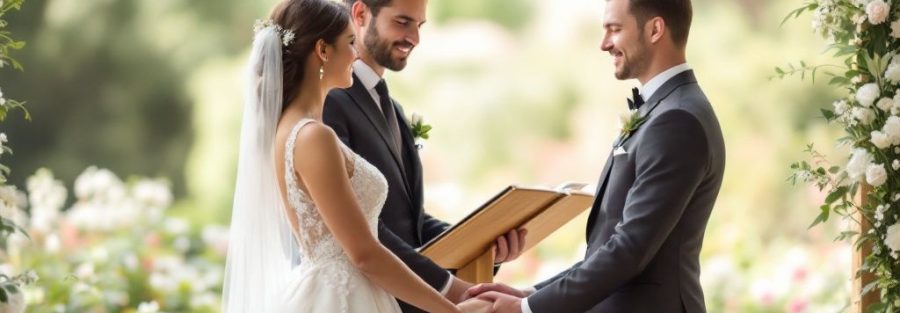The Soul of Your Ceremony: Understanding Your Officiant's Role

Your wedding officiant does way more than just announce you're married. Think of them as the architects of your ceremony, carefully designing the emotional feel of your big day. It's a delicate balance: they have to make sure everything is legally sound while also weaving in the unique story of your relationship. Their influence goes way beyond the "I do's," setting the mood for the entire celebration.
This careful planning often starts months beforehand. A truly great wedding officiant doesn't just magically appear on the day. They work closely with couples, guiding them through the logistics and emotional prep work. This can include anything from navigating the legal side of marriage to offering advice on the ceremony's structure, and even helping create meaningful rituals. This guidance ensures a smooth, personalized experience, minimizing stress and maximizing joy.
Beyond the Legalities: The Art of Storytelling
The best officiants get that a wedding ceremony is, at its core, a story. It's the story of your journey together, your love, and your dreams for the future. An officiant who's a good storyteller can weave your unique narrative into the ceremony itself. Think personal anecdotes, custom vows, or symbolic rituals that reflect who you are as a couple.
For example, a couple who met while backpacking through Europe might include a sand ceremony symbolizing the blending of their different backgrounds. Or, music lovers could have a friend or family member perform a special song. These personal touches transform a standard ceremony into a deeply moving experience for everyone.
Additionally, the officiant industry has seen some serious growth. By 2024, officiant services in the U.S. generated $813.3 million in revenue, showing a 3.7% compound annual growth rate (CAGR). While the market has had its ups and downs – a wedding "boom" in 2022 followed by a slower 2024 – the consistent number of over two million marriages every year provides a solid base for officiants to continue helping couples start this new chapter. Find more detailed stats here: https://www.ibisworld.com/united-states/industry/officiant-services/6351/
The Officiant's Lasting Impact
At the end of the day, the right officiant is the invisible thread connecting the most powerful moments of your ceremony. They bring a sense of calm and reassurance, making sure everything flows smoothly and authentically. They create a space for joy, laughter, and happy tears, letting your love story unfold in a way that's both meaningful and memorable. Their impact goes way beyond the ceremony, leaving a lasting impression on your wedding day and the start of your married life. This is why choosing the right officiant is such a big decision.
Choosing Your Ceremony Voice: Types of Wedding Officiants
Picking the right officiant is a big deal – they set the whole vibe for your ceremony. And there are tons of options out there! From religious leaders to judges and even your best friend, each officiant brings something different to the table. Let's break down the different types so you can find the perfect voice for your big day.

This infographic shows what most couples are doing these days. Religious officiants are still super popular at 45%, followed by civil officiants at 35%, and secular officiants at 20%. It just goes to show, there’s no right or wrong answer – it’s all about what feels right for you.
Religious Officiants: Keeping It Traditional
Want to weave your faith into your ceremony? A religious officiant is the way to go. This is usually someone from your church, temple, or mosque, or maybe someone who specializes in interfaith ceremonies. They’ll bring that sense of tradition and spirituality, with readings, prayers, and rituals that are meaningful to your faith. Think Bible verses for a Catholic ceremony, or the Seven Blessings for a Jewish wedding.
Civil Officiants: Short, Sweet, and Legal
Civil officiants are all about the legal stuff. They make sure your marriage is official, often in a simple and straightforward way. This is perfect if you want a non-religious ceremony that’s still legally binding. Plus, many civil officiants are happy to include personalized vows or readings, so you can still add your own special touch.
Professional Celebrants: Your Ceremony, Your Way
If you're dreaming of a totally unique and personalized ceremony, a professional celebrant is your best bet. They’ll work with you to create a ceremony that tells your love story, reflects your values, and incorporates anything you want. Maybe you want to blend traditions from different cultures, write your own vows from scratch, or create a symbolic ritual – the sky's the limit! This level of customization makes your ceremony truly one-of-a-kind. You might even want to check out broader event services like: 1021 Events Sitemap.
Friend or Family Member as Officiant: The Personal Touch
More and more couples are asking a close friend or family member to officiate. It adds a deeply personal touch, but it's not a decision to take lightly. There’s some extra legwork involved, like making sure they understand the legal requirements and can handle leading the ceremony smoothly. Open communication and lots of preparation are key to making this a meaningful and stress-free experience.
To help you compare and contrast these options, take a look at the table below:
Comparison of Wedding Officiant Types
This table compares different types of wedding officiants based on cost, style, legal stuff, booking timeline, and how much you can personalize the ceremony.
| Officiant Type | Average Cost | Ceremony Style | Legal Requirements | Booking Timeline | Customization Level |
|---|---|---|---|---|---|
| Religious Officiant | Varies (often donation-based) | Traditional, faith-based | Varies by religion & location | Several months to a year | Moderate |
| Civil Officiant | $200 – $500 | Simple, legal | Must be authorized by the state | Several weeks to months | Moderate |
| Professional Celebrant | $500 – $1,000+ | Highly personalized, flexible | Must be authorized by the state | Several months to a year | High |
| Friend or Family Member | Varies (often gift-based) | Personal, intimate | Must meet state requirements for officiants | Varies | High |
As you can see, each type of officiant has its own pros and cons in terms of budget, style, and how much you can personalize things.
Choosing the Right Fit: Ask the Right Questions
No matter which type of officiant you’re leaning towards, asking questions is a must. Chat about their experience, their usual ceremony style, and how they handle personalization. This will help you figure out if they're a good match for your vision. Talking about your preferences for readings, music, and the overall tone is also super important for creating a ceremony that really reflects your relationship.
Weaving Your Story: Cultural and Personalized Ceremonies

Your wedding ceremony should tell your unique love story. Forget generic scripts! Finding the right officiant is key. They're like a cultural translator and a storyteller, blending traditions and personal touches for an authentic feel. Think honoring your heritage while ditching outdated expectations.
Honoring Heritage, Embracing Modernity
Skilled officiants can seamlessly blend cultural backgrounds. Imagine a couple incorporating a traditional tea ceremony to honor their Asian heritage, followed by a handfasting ritual from Celtic traditions. This personalized approach celebrates diverse backgrounds in a truly meaningful way. It’s all about balancing tradition with modern love.
Also, officiants help navigate family expectations. Let’s be real, families sometimes have strong opinions. A seasoned officiant can diplomatically handle these, ensuring the ceremony stays true to the couple's vision. This takes empathy and clear communication.
Wedding ceremonies are becoming increasingly personalized and culturally diverse. In fact, 21% of weddings in 2024 included special customs, highlighting the vital role officiants play. This shows a bigger trend towards personalized wedding experiences. Plus, the global wedding services market is booming, projected to grow from $175.46 billion in 2022 to $295.47 billion by 2027. Check out more stats here: https://www.theknot.com/content/wedding-data-insights/real-weddings-study
From Standard to Extraordinary: The Power of Storytelling
The best officiants don't just read words – they tell stories. They work closely with couples to uncover unique anecdotes and moments that make ceremonies deeply personal. Think a special reading, a musical performance, or a meaningful ritual.
Understanding different brand voice styles can help you shape the officiant’s tone. This helps you find an officiant whose style matches your vision. It’s more than just words; it’s about the overall feel and emotional impact.
Creating a Ceremony That Moves and Inspires
A truly exceptional officiant collaborates with the couple to create a ceremony that’s not just legal, but also deeply moving and inspiring. It's about a shared experience that celebrates the couple’s unique love story in a way that is both authentic and unforgettable. This collaborative approach ensures the ceremony reflects the couple’s personalities, values, and the amazing journey they’re starting together.
Finding Your Perfect Match: The Officiant Search Decoded
Finding the right officiant for your wedding is about way more than just picking a random name from a vendor list. It's about finding someone who really gets you as a couple and can create a ceremony that truly reflects your unique love story. This section breaks down the officiant search process and gives you a practical guide to finding the perfect person to bring your vision to life.
Where to Begin Your Search
Lots of happy couples find their perfect officiant in a few different ways. Online wedding vendor platforms are a great place to start. They usually have detailed profiles and reviews, which can be super helpful. But don't forget about the power of personal recommendations! Talking to friends, family, or even other wedding vendors can sometimes lead you to some amazing officiants you might not have found otherwise. Checking out local wedding blogs and forums is another good idea. You can connect with officiants who are familiar with your area and might specialize in the kind of ceremony you're looking for, like humanist or interfaith weddings.
The Art of the Officiant Interview
Once you've got a shortlist of potential officiants, the interview is key. Don't just ask about logistics. Ask thoughtful questions about their experience with different types of ceremonies, how they personalize their approach, and what they do if things go wrong on the day. Seasoned wedding planners often recommend asking about their public speaking style, how well they connect with different kinds of people, and how comfortable they are incorporating cultural or religious traditions. This helps you figure out if their personality and style match your vision. Check out our article on navigating sitemaps for event planning for more tips.
Before we dive into the essential questions, let's talk about why they matter. Choosing the right officiant is a big deal; they're the ones who'll be leading one of the most important moments of your lives. Asking the right questions helps you find someone who’s not just qualified, but also a great fit for your personalities and vision.
Here’s a handy table summarizing key questions you should consider asking any potential officiant:
| Category | Questions | Why It Matters |
|---|---|---|
| Experience | How many weddings have you officiated? What types of ceremonies are you most comfortable with? | This gives you a sense of their overall experience and what they specialize in. |
| Personalization | How do you incorporate a couple's story into the ceremony? Can we customize our vows? | This shows how flexible they are and how willing they are to make your ceremony truly unique. |
| Logistics | What is your fee structure? What services are included? What is your backup plan in case of emergencies? | This clarifies all the practical details like costs, what you're getting for your money, and how they handle unexpected situations. |
| Style | Can you describe your typical ceremony style? Can we see examples of past ceremonies you’ve officiated? | This helps you see if their style matches your vision for the tone and feel of your ceremony. |
After you’ve interviewed a few officiants, take some time to review your notes and reflect on your conversations. Which officiant felt like the best fit for your personalities and wedding style? Who seemed the most organized and professional? Trust your gut feeling; it’s usually right!
Red Flags and Green Lights
As you're figuring things out, keep an eye out for both good and bad signs. Red flags could be an officiant who's slow to respond, inflexible, or doesn't seem to care about your ideas. Green lights, on the other hand, are things like an officiant who listens carefully, offers creative ideas, and is genuinely excited about your wedding.
Decoding Reviews and Testimonials
Online reviews can be useful, but it's important to read between the lines. Look for specific comments in testimonials about things like the officiant's warmth, sense of humor, or their ability to create a really touching ceremony. These details often tell you more than just a star rating. Taking the time to really understand the reviews can help you choose an officiant who isn't just good, but truly amazing.
Making It Official: Navigating Ceremony Legal Requirements
So you're planning your big day, and while you're caught up in the whirlwind of dress fittings, cake tastings, and seating charts, don't forget the less glamorous, but equally important, legal side of things. Yep, we're talking about the legal requirements that make your marriage official. Understanding these details ensures your special day is both memorable and legally binding.
Essential Documentation and Questions for Your Officiant
Before you walk down the aisle, have a chat with your officiant about the necessary paperwork. This can save you a lot of stress later on. Some key questions to ask include: "Are you registered to perform marriages in this state/country?" and "What documents do I need to make this legal?". Don't forget to ask about the marriage license process, too! Knowing these details ahead of time ensures a smooth and stress-free experience.
Marriage License Timelines: What Planners Wish You Knew
Wedding planners will tell you that understanding marriage license timelines is crucial. These licenses have expiration dates, so you need to get married within a specific timeframe. Plus, there might be a waiting period before the license is valid after you apply. For example, some places have a 72-hour waiting period. Factor this into your planning to avoid any last-minute hiccups. Do your research on the rules in your area.
Destination Weddings and International Marriages: Added Considerations
Destination weddings and international marriages add another layer of legal complexity. Every country has unique marriage laws and required documents. Some countries may require blood tests or translated documents. So, research the specific rules of your chosen country well in advance. You might even need to contact the local embassy or consulate. Making sure your marriage is internationally recognized could involve additional steps after the ceremony, too. You might be interested in: Our complete guide to wedding resources.
The wedding services market, including officiant services, is booming. More people are getting married and new services are popping up all the time. In the United States, marriages increased from 1,676,911 in 2020 to 1,985,072 in 2021. This upward trend is global, with areas like Asia-Pacific leading the market. Learn more about the expanding wedding market. Officiants are now offering more services to meet the diverse needs of couples, which contributes to this growth.
Ensuring a Legally Sound and Meaningful Ceremony
Don't let the legal stuff overwhelm you. By working with your officiant and understanding the rules of your chosen location, you can ensure your ceremony is legally sound. Then you can focus on what really matters: celebrating your love story without a worry in the world.
Investing in Your Ceremony: Officiant Costs and Value

Figuring out how much an officiant costs is a big part of planning your wedding budget. After all, the officiant plays a key role in making your big day special. This section breaks down what goes into officiant fees – it's more than just how long the ceremony is! We'll look at how custom requests affect pricing, what services are usually included, and why location matters so much.
Decoding Officiant Fees: What Influences the Cost?
A few things go into how much an officiant charges. Adding personal touches, like special rituals or custom vows, usually increases the cost. Things like pre-marital counseling or attending the rehearsal might be extra, too. Where you're getting married matters a lot – officiants in big cities tend to charge more. An officiant’s experience and how well-known they are also play a role, with in-demand officiants charging higher fees.
Standard Packages vs. Premium Services
Most officiants have standard packages that cover the ceremony, a few meetings beforehand, and filing the marriage license. Premium packages might include extras like help writing your vows, symbolic rituals, or travel outside a certain area. It's good to know what each package offers so you can make the best choice for you. A simple civil ceremony might be fine with a standard package, while a more personalized wedding with cultural traditions might need a premium package.
Navigating Geographic Price Variations
Officiant fees can be really different depending on where you're getting married. It's not just travel expenses; it also depends on what’s typical for the area and how many people are looking for officiants. Officiants in popular wedding spots or big cities often charge more because they’re in high demand. On the other hand, officiants in smaller towns might have lower fees. That’s why it's smart to check out officiants near where you’ll be saying "I do." Learn more in our article about wedding portfolios and services.
Finding Affordable Options Without Compromising Quality
If you're watching your budget, there are ways to save on officiant costs without sacrificing quality. Think about having your wedding on a weekday or during the off-season. Officiants sometimes give discounts for less popular dates. You could also look for newer officiants who are still building their reputations and offer competitive rates. Remember, a lower price doesn't always mean lower quality – plenty of talented officiants provide excellent services at affordable prices.
Evaluating Value: What You're Really Paying For
When you’re choosing an officiant, think about what they bring to the table. Are they a good storyteller who can create a meaningful ceremony? Do they listen to what you want and help bring your vision to life? Do they have a calming presence and act professionally? These things are super important for a smooth and memorable ceremony, and they're worth the investment. You’re not just paying for the ceremony itself; you're paying for the experience, guidance, and peace of mind that a professional officiant brings. This makes sure your ceremony isn't just legal, but also beautiful and memorable.
Creating Ceremony Magic: Your Officiant Partnership Timeline
Finding the perfect officiant is a huge step in wedding planning, but the real fun begins when you start working together. A truly memorable ceremony doesn't just appear overnight. It takes time, thought, and a solid partnership built over months, not weeks. This timeline will guide you through each step of working with your officiant, making sure your ceremony is as unique and special as your love story.
From Initial Contact to First Impressions: The Early Stages
Your officiant journey starts with reaching out. After you've researched and found a few officiants you like, schedule some introductory calls or meetings. This first stage is all about first impressions. Notice how responsive they are, how willing they are to answer questions, and if they seem to get your vision. This initial connection sets the stage for the entire process.
Sharing Your Story: Building the Foundation
After choosing your officiant, the real work begins. This is when you share your story – how you met, what you love about each other, and what makes your relationship special. Open communication is key for a successful ceremony. Share personal stories, important values, and anything else you want to incorporate, like cultural or religious traditions. For some tips on creating a memorable event without breaking the bank, check out these cost-effective design solutions.
Crafting the Ceremony: From Draft to Masterpiece
With your story as inspiration, your officiant will start drafting the ceremony. This is a teamwork effort. Review each draft, give feedback, and make suggestions. The best officiants are open to revisions because they know it's your ceremony. Looking for some creative inspiration? Check out these event planning examples and case studies. This back-and-forth makes sure the final version truly reflects you as a couple.
Coordinating the Details: Seamless Ceremony Flow
Your officiant does more than just write the script. They're also essential for coordinating the logistics. They'll work with your other vendors – like the photographer, musicians, and coordinator – to make sure everything runs smoothly. This is especially important for things like the processional timing, music cues, and readings. Getting everyone on the same page minimizes stress and maximizes the impact of every moment.
The Rehearsal and Final Touches: Practice Makes Perfect
Rehearsals are important! It’s more than just going through the motions; it's about building confidence and making sure everyone is comfortable. The rehearsal solidifies the flow, addresses any last-minute questions, and helps calm those pre-wedding nerves. This final run-through lets you relax and be present on the big day.
Handling the Unexpected: Grace Under Pressure
Even the best-laid plans can go sideways. A great officiant can handle unexpected issues with grace and flexibility. Whether it's a sudden downpour or a last-minute guest cancellation, they’ll adjust and make sure your ceremony stays meaningful and special. This ability to handle curveballs is a must-have for a smooth wedding day.
This timeline helps make working with your officiant a collaborative journey, resulting in a ceremony that’s not just legally binding, but also deeply personal and truly unforgettable. Ready to plan your dream wedding? Visit 1021 Events for a full range of services, from DJ and MC services to amazing visual effects that will make your day even more special. Let them help you bring your vision to life and create a celebration that reflects your unique love story.




